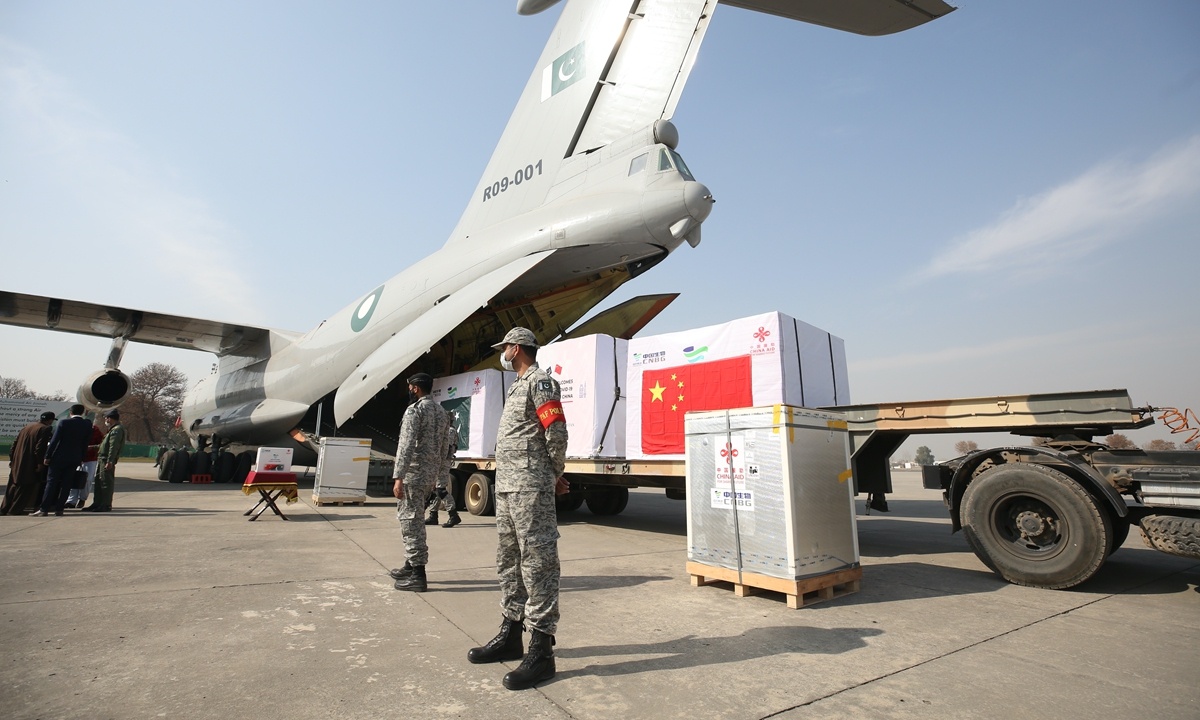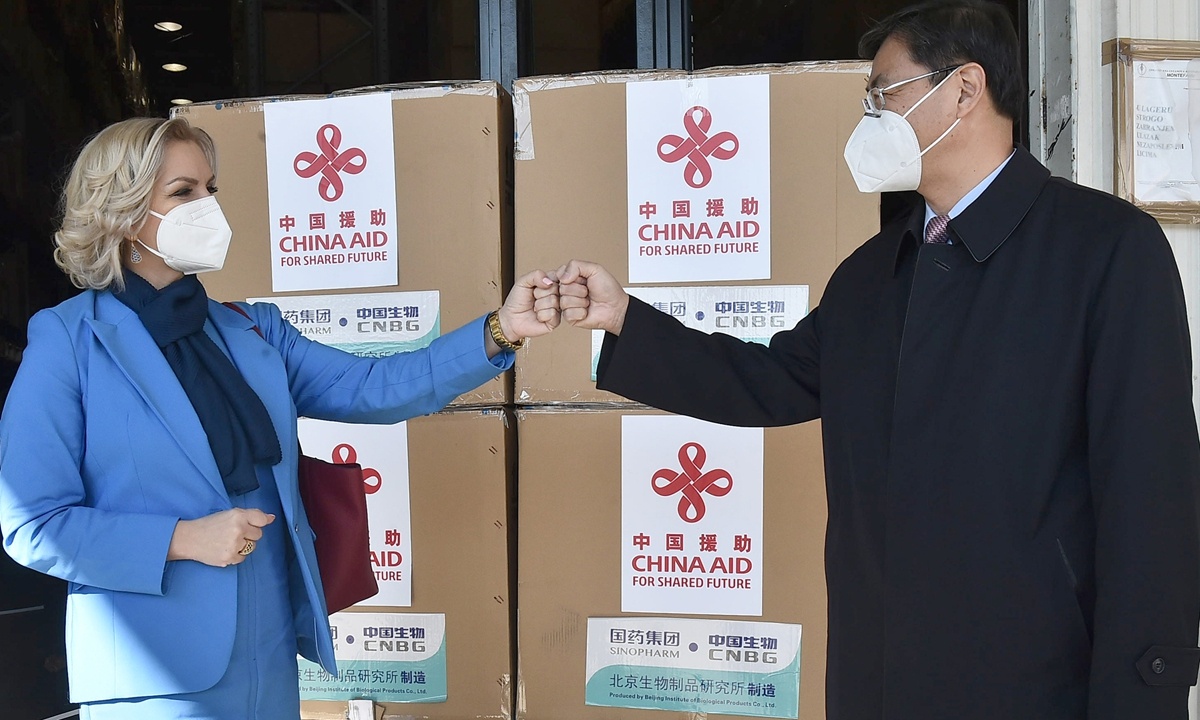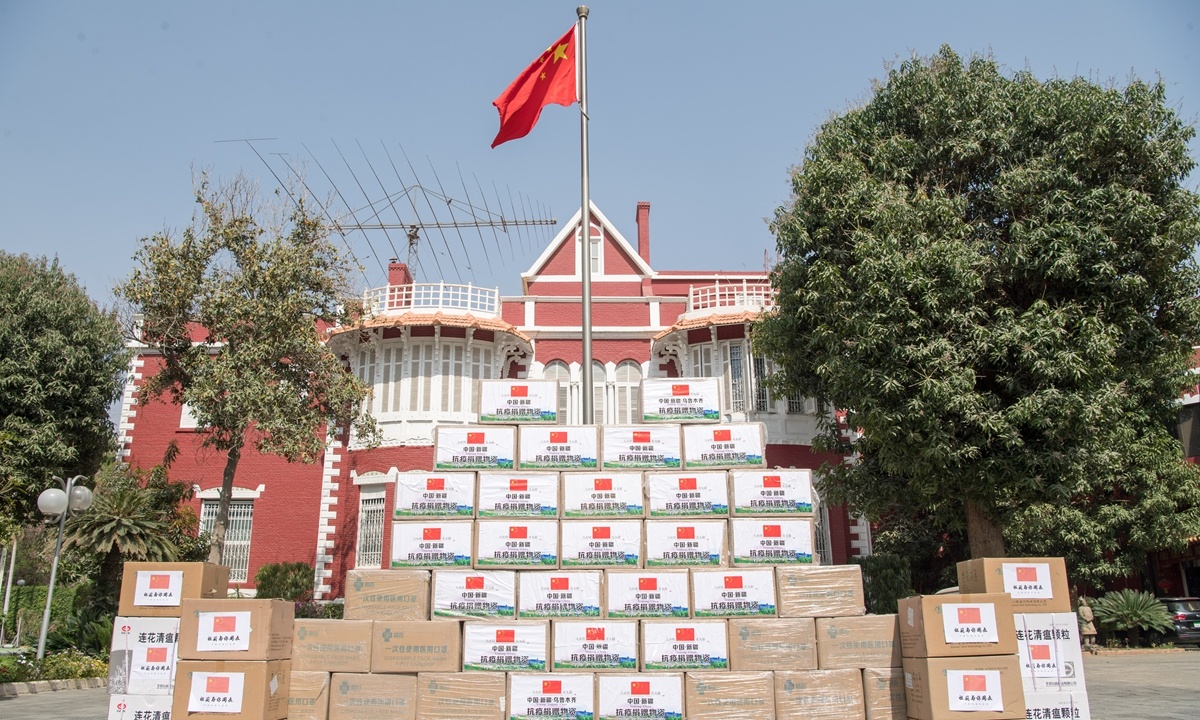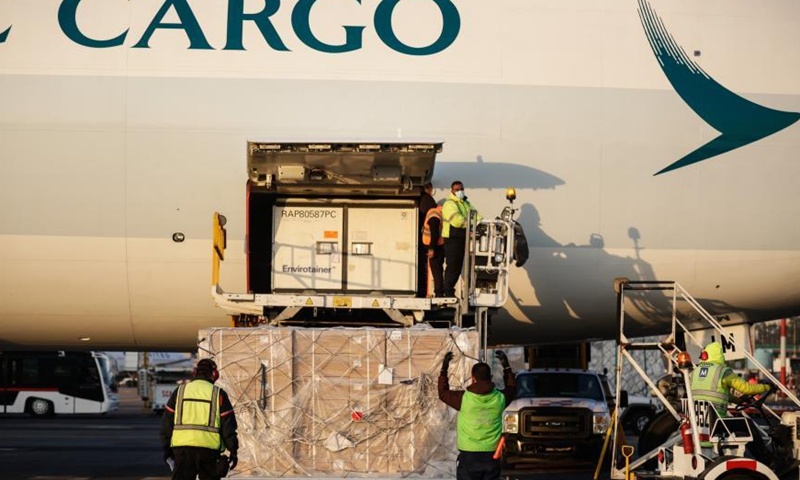China has announced plans to further protect its citizens abroad in the COVID-19 pandemic by launching a program to have them inoculated with Chinese or foreign vaccines as much and as soon as possible, but it also faces practical challenges, such as local vaccination regulations, vaccine entry approval or even political concerns.
Shortly after Chinese State Councilor and Foreign Minister Wang Yi announced the plan, dubbed the "spring sprout vaccine" program, on March 7, Chinese embassies around the world have since responded and swung into action.
In some countries, especially those using Chinese vaccines, information collection and registration efforts for possible vaccination have begun, while in more countries, embassies have sent out notices on vaccination.
Though difficulties remain, Chinese citizens abroad reached by the Global Times express their expectations and confidence toward the plan. Insiders and observers said that the program could also serve as an opportunity for Chinese vaccines to enter more countries and help local residents.
According to the program, China would help secure COVID-19 vaccines for its citizens abroad. China will set up stations for administering Chinese vaccines in countries "equipped with conditions," to provide inoculation services for Chinese nationals residing in nearby countries and regions.

Chinese vaccines arrive in Pakistan in February. (Photo: Xinhua)
Move fast
Chinese embassies in many countries have begun to count the vaccination intent of local Chinese nationals and continue to promote vaccination programs.
According to the Chinese Embassy in Egypt, local Chinese citizens can sign up for injection through local Chinese chambers and student associations. The vaccination rollout is scheduled to start on March 16. The Embassy has also coordinated to set up two special vaccination sites for Chinese citizens in Cairo.
The Egyptian government has included local Chinese citizens in the local vaccination system, and on this basis, the Chinese Embassy in Egypt has actively negotiated with the Egyptian government to regard Chinese citizens as a "priority group" to be vaccinated with the Chinese Sinopharm COVID-19 vaccine, Chen Jiannan, president of China Council for The Promotion of Peaceful National Reunification in Egypt (CCPPRE) told the Global Times.
Chen said the council has assisted the Chinese embassy in collecting vaccination information from more than 1,300 Chinese nationals and has issued tips to help those with poor English and Arabic to register on the Egyptian Health Ministry's website.
The Chinese Embassy in Ukraine also confirmed to Global Times that the embassy has started the registration of vaccination intent on Sunday. As soon as the vaccine arrives in Ukraine, the vaccination of registered Chinese citizens will begin.
"The Chinese Embassy in Egypt also invited Sinopharm's experts to guide vaccination plans via video conference. I posted the key points of the conference to our three WeChat vaccination support groups, which received a great response," Chen said.
"The Chinese Embassy in Chile has repeatedly communicated with local health authorities, asking them to provide the necessary facilities for Chinese citizens to receive vaccinations in an orderly manner," Li Hongguang, president of Chile Chung Wha Overseas Chinese Association told the Global Times.
Li Hongguang noted that currently, Chile has included local Chinese citizens in the COVID-19 vaccination program. Chinese citizens can be vaccinated on time as long as they follow the local vaccination schedule and make an appointment like locals.
Li Hongguang believed that the "spring sprout vaccine" program will be implemented smoothly in Chile because of the long-standing good relationship between China and Chile, more importantly, the friendly cooperation between the two sides on the COVID-19 vaccines.

Chinese Ambassador Liu Jin (right) in Montenegro greets with Montenegrin Health Minister when Chinese vaccines arrived in Podgorica on March 7.
Even before the "spring sprout vaccine" program was announced, Chinese embassies in many countries had already been working on getting more citizens vaccinated.
The embassy in Turkey and the Turkish Ministry of Health, in late February, had already carried out a vaccination program for Chinese nationals in Turkey.
"The embassy received the registration information and sent the list to the Turkish Ministry of Health. The Ministry then issued vaccination instructions to local hospitals, and Chinese citizens who registered for vaccination can go to the nearest hospital to get vaccinated by themselves free of charge," Liu Jianmin, head of the Turkish branch of an international freight company, said.
"As far as I know, since February, Chinese companies in Indonesia have started registering their Chinese employees who wish to be vaccinated." A Chinese working in Indonesia surnamed Lu said, "The vaccination has not started yet because the batch has not yet arrived in Indonesia."
Facing challenges
Many Chinese abroad are eager for vaccinations as some Western countries with large Chinese populations are still grappling with the pandemic. The Chinese embassies in such countries have been actively helping local Chinese citizens to get vaccinated per the laws and regulations of the host country.
Although many Western countries like the UK and the US, have declared their intention to provide vaccines to all residents including migrants, the waitlist is too long.
However, due to practical hurdles such as vaccine approval, transportation, and even political machinations, Chinese embassies in some countries cannot provide Chinese COVID-19 vaccines to Chinese citizens in host countries under the "spring sprout vaccine" program.
According to the WeChat public account of the Department of Consular Affairs under China's Foreign Affairs Ministry, many Chinese embassies in foreign countries have released an official announcement to provide detailed information about how to get vaccinations in the countries of residency for Chinese citizens.
For instance, in an announcement, the Chinese Embassy in Belgium said the Belgian government has included Chinese citizens in its national vaccination program, and so far four vaccines have been approved for use, which have been engineered by Pfizer, Modena, AstraZeneca and Johnson & Johnson.
The local health department will send invitations for vaccination via email, text message, or by letter. The embassy reminded Chinese citizens to pay close attention to local vaccination arrangements and get vaccinated on an informed and voluntary basis according to their own conditions.
The Chinese Embassy in Canada said that China and Canada are communicating on the program at present.
However, according to Chinese embassies in the UK and Australia, local embassies haven't conducted any work with regards to the implementation of the "spring sprout vaccine" program to provide Chinese vaccines as of the time of publication.

Chinese Embassy in Egypt distributes healthcare packages to local Chinese students in April 2020. (Photo: Xinhua)
In the UK, conditions are not ready for vaccinating Chinese nationals with Chinese vaccines, the Chinese embassy said. But they provide support to help Chinese citizens to get vaccinations in local medical institutions according to local laws and regulations.
A 27-year-old Chinese man, Li Yifan, who is pursuing a master's degree in medicine in London, told the Global Times that he prefers to get a Chinese vaccine if the program is launched in the UK. He said many of his friends are looking forward to the Chinese vaccine.
"Born and raised in China, I am more compatible with Chinese vaccine products physically and psychologically," Li Yifan noted.
According to the statistics released by the University of Oxford, the UK has given 26.06 million doses of vaccines as of March 14.
Although the UK government has promised to give COVID-19 vaccines to all residents in the UK, people in high-risk categories such as health workers and the elderly are on the priority list. Young and healthy residents like Li Yifan can make an appointment and may get the first dose by early June.
Chinese nationals living in the US also encounter such difficulties. They understand local regulations for vaccination but are still desperate to receive vaccination as soon as possible.
Tom, a Chinese living in Alabama who owns a Chinese restaurant, told the Global Times on Monday that each state in the US has its own progress for vaccination. There is a certain degree of discrimination against the Chinese in the local area.
Tom said most Chinese in Alabama have not heard the related news about China's "spring sprout vaccine" program to be carried out in the US. They are expecting to be vaccinated in May, as US President Joe Biden announced all eligible Americans will be vaccinated by May 1, according to the official website of the White House.
Currently, the Chinese Embassy in South Africa has developed detailed plans to promote the vaccination of local Chinese citizens, including helping South Africa to expand the local vaccination population with Chinese-made vaccines, or provide vaccines to Chinese citizens separately, Li Xinzhu, director of South Africa Chinese Community & Police Co-operation Center told the Global Times.
Li Xinzhu noted that Chinese vaccines have not gained market access in South Africa, and the "spring sprout vaccine" program is going through the approval process by local health authorities currently.
"Although local departments claimed that all South Africa have access to the vaccines, the number of vaccines currently available does not cover the majority of the local population, including the Chinese community," Li Xinzhu said.
"We are eagerly awaiting the vaccine, as the pandemic is still very serious in South Africa and local hospitals do not have effective treatments, with many compatriots even choosing to return to China for vaccination," he added.
Li Xinzhu said he does not want to see the South African government get caught up in the political intrigue of vaccine supply in the future, and instead promote full vaccination from the needs of the population.
Negotiations undergoing
The Global Times learned that more Chinese embassies and consulates abroad are now in close negotiations with the governments of their host countries in an attempt to include Chinese citizens into local national immunization programs. It is reportedly a key way to implement the "spring sprout vaccine" program.
A diplomat from the Chinese Embassy in India told the Global Times that specific measures to achieve such a goal are still under discussion with the Indian side. "India is now extending its vaccination campaign. It has a vaccination program for diplomats from other countries, but it has not been heard that the same treatment applies to citizens of other countries," said the diplomat.

Staff members unload a container of the COVID-19 vaccine from the Chinese pharmaceutical company Sinovac at the Mexico City's international airport in Mexico, March 13, 2021. The third shipment of the COVID-19 vaccine from the Chinese pharmaceutical company Sinovac arrived Saturday at the Mexico City's international airport. (Photo:Xinhua)
Another diplomat from the Chinese Embassy in Nepal also said that they are negotiating with the Nepalese government to bring the local Chinese into the national vaccination plan. If the donated doses of Chinese vaccines were to arrive in Nepal, part of the jabs would be given to the local Chinese, the diplomat said.
Experts expect that as the production capacity and quantity of vaccines in different regions increases, overseas Chinese nationals will be increasingly able to get a dose of Chinese COVID19 vaccines.
However, Chinese vaccines are now facing temporary difficulties in officially entering some mainstream Western countries in Europe and America, among which is the politicalization of the vaccines.
There would be two primary ways for overseas Chinese nationals to get vaccinated with Chinese vaccines: first, it can be achieved if respective foreign governments officially purchased Chinese vaccines, upon approval by their respective drug administration departments or the WHO, and include the local Chinese in the national immunization program, Tao Lina, a Shanghai-based vaccine observer, told the Global Times.
Another possibility is to agree to a small-scale exclusive vaccination of overseas Chinese nationals at the Chinese Embassy through bilateral diplomatic communication between two governments. This could be a special solution for vaccinating targeted groups during such a critical moment. It will be supportive to those Chinese nationals aiming to obtain "vaccine passports" to resume travel back to the homeland, Tao suggested.
Tao stressed that if Chinese vaccines can obtain the WHO's pre-qualification, it would help boost global confidence toward Chinese vaccines worldwide and further promote the practice of the "spring sprout vaccine" program.
The Global Times previously learned from a major Chinese vaccine producer, Sinovac Biotech that it is possible WHO would approve the company's COVID-19 vaccine by the end of March. A WHO expert team inspected the Sinovac production line in Beijing in February and gave the company pertinent and significant suggestions on improving medical quality.


